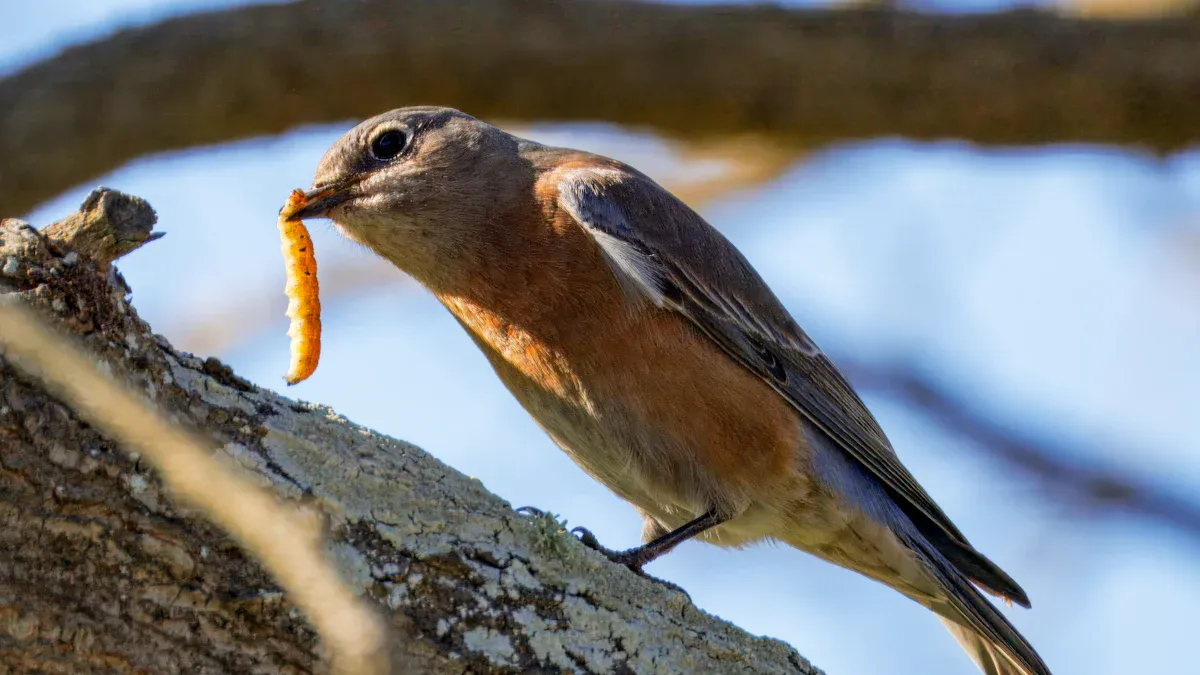
Mealworms for Parrots provide a rich source of protein and healthy fats. Birds thrive with this superfood, gaining energy and vibrant feathers. Responsible owners add mealworms as a supplemental treat. Parrots experience better health and vitality when their diet includes this natural, nutrient-packed option.
Key Takeaways
- Mealworms provide parrots with high-quality protein and essential amino acids that support muscle growth, feather health, and overall vitality.
- Healthy fats in mealworms supply energy and promote brain function, helping parrots stay active and maintain shiny feathers.
- Use mealworms as a supplement, not a main food, feeding small amounts a few times a week to keep parrots healthy and balanced.
Nutritional Benefits of Mealworms for Parrots
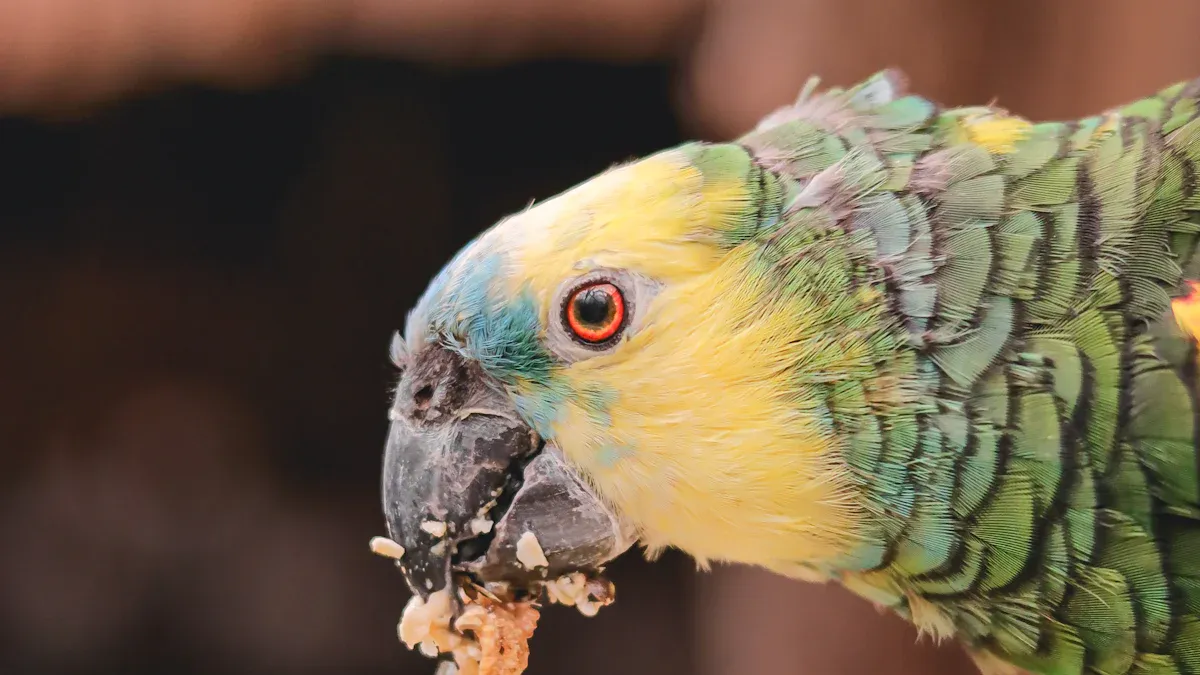
High Protein and Essential Amino Acids
Mealworms for Parrots deliver a powerful protein punch that supports muscle growth, feather development, and overall health. Parrots need protein to stay active and vibrant. Dried mealworms contain about 52.89% crude protein, which matches or even exceeds many traditional protein sources. This makes them a smart choice for bird owners who want to boost their pet’s nutrition.
| Protein Source | Protein Content (%) (Dry Weight) |
|---|---|
| Mealworms | Approximately 40.2 – 63.3 |
| Soybean Meal | Around 49.4 |
| Fish Meal | Approximately 60 – 72 |
Mealworms for Parrots also provide all essential amino acids. These amino acids help parrots build strong muscles and maintain healthy feathers. Many seeds and fruits lack certain amino acids, but mealworms fill this gap. The table below shows the impressive amino acid content in mealworms:
| Essential Amino Acid | Content in Mealworms (g/kg, as-is basis) |
|---|---|
| Lysine | 10.7 |
| Methionine | 2.55 |
| Threonine | 7.57 |
| Valine | 12.8 |
| Isoleucine | 8.35 |
| Leucine | 14.0 |
| Phenylalanine | 6.54 |
| Histidine | 5.59 |
| Arginine | 13.8 |
| Tryptophan | 2.16 |
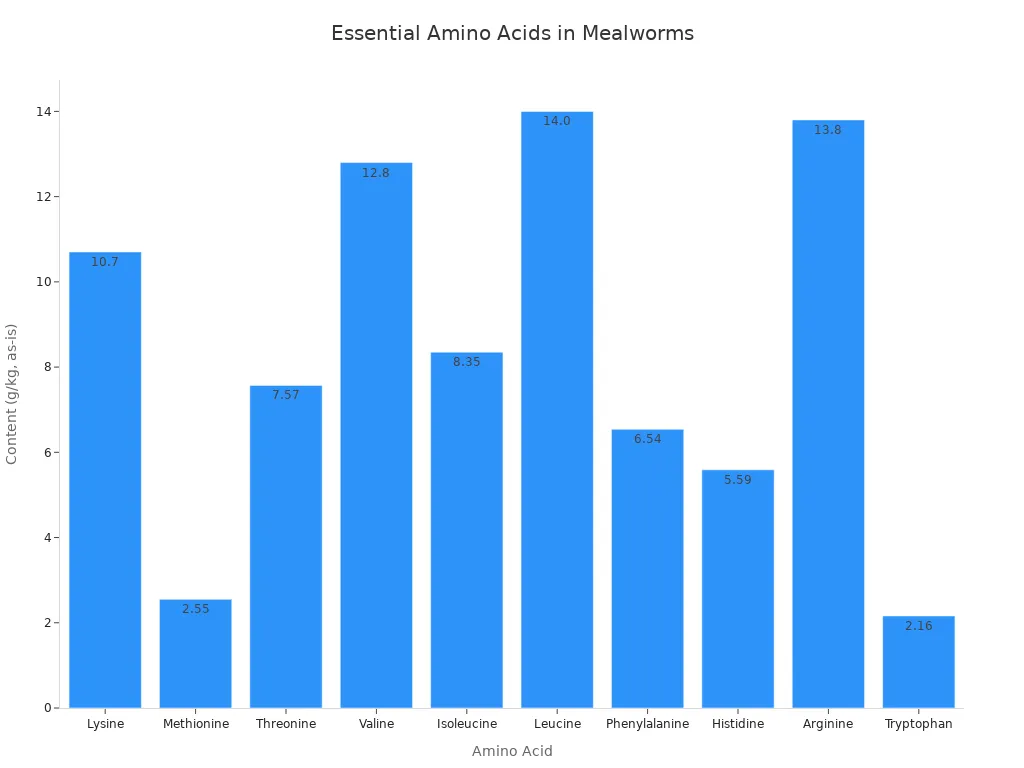
Mealworm protein is also easy for parrots to digest. Studies show that most amino acids in mealworms are digestible at rates above 90%. This means parrots can absorb and use these nutrients efficiently, making mealworms a top-tier protein source.
Tip: Adding mealworms to a parrot’s diet can help meet their daily protein and amino acid needs, especially during molting or breeding seasons.
Healthy Fats and Energy Support
Mealworms for Parrots are not just about protein. They also offer healthy fats that provide energy and support brain function. These fats help parrots stay active and keep their feathers shiny and smooth. Mealworms contain about 33% fat, with most of it coming from unsaturated fatty acids like oleic and linoleic acids.
| Fatty Acid Type | Quantity Range (% of Total Fatty Acids) | Notes |
|---|---|---|
| Oleic acid (C18:1 n-9) | 32.97% – 46.74% | Predominant fatty acid in mealworms |
| Linoleic acid (C18:2 n-6) | 22.79% – 38.98% | Second most abundant fatty acid |
| α-Linolenic acid (C18:3 n-3) | Up to 17% (with flaxseed-enriched diets) | Can be significantly increased by diet manipulation (e.g., flax flour) |
| Palmitic acid (SFA) | 12.80% – 17.81% | Main saturated fatty acid |
| Total fat content | 22.3% – 30% (crude fat, dry matter basis) | Can reach up to 48.31% depending on diet and processing |
| PUFA/SFA ratio | Up to 2.79 (improved with flaxseed diet) | Indicates a healthy balance of polyunsaturated to saturated fats |
| ω-6/ω-3 ratio | Reduced to 1.71 with flaxseed diet | Healthy ratio close to recommended values (4:1–5:1) |
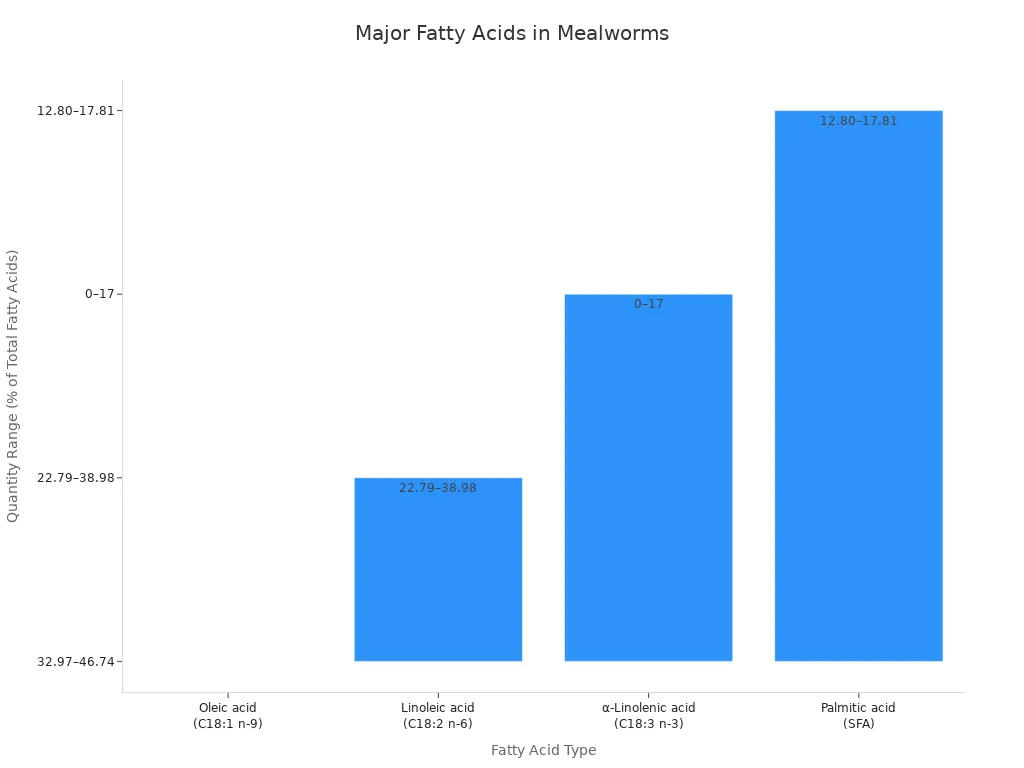
These healthy fats give parrots the energy they need for flying, playing, and exploring. The fatty acid profile in mealworms also supports brain health and reduces stress during periods of high activity, such as migration or breeding.
Note: The fats in mealworms are mostly unsaturated, which are considered heart-healthy for birds.
Vitamins, Minerals, and Digestibility
Mealworms for Parrots supply important minerals like calcium and phosphorus. These minerals help parrots build strong bones and support vital metabolic functions. The table below highlights the main nutrients found in mealworms:
| Nutrient | Approximate Content in Mealworms |
|---|---|
| Protein | 35% |
| Fat | 50% |
| Calcium (Ca) | 0.26% |
| Phosphorus (P) | 0.23% |
Mealworms also contain chitin, a natural fiber that acts as a prebiotic. Chitin supports gut health and improves nutrient absorption. Scientific studies show that the nutrients in mealworms are highly bioavailable, meaning parrots can absorb and use them easily. This makes mealworms a smart addition to any parrot’s diet.
Tip: Choose hygienically raised mealworms to ensure safety and maximize nutritional benefits.
Mealworms for Parrots stand out as a superfood because they combine high-quality protein, healthy fats, and essential minerals in a form that parrots can easily digest and enjoy. Adding them as a supplement can help parrots thrive, supporting energy, feather health, and overall vitality.
Mealworms for Parrots: Comparison, Preferences, and Safe Feeding
Mealworms vs. Other Bird Foods
Mealworms for Parrots stand out among bird treats because of their impressive nutrient density. Compared to other protein-rich foods, mealworms offer a higher protein and healthy fat content, plus essential minerals. The table below highlights how mealworms compare to traditional options:
| Food Type | Protein (%) | Fat (%) | Key Minerals (mg/100g) |
|---|---|---|---|
| Mealworms | 40.2–63.3 | 22.3–39.5 | Sodium, Magnesium, Potassium |
| Fish Meal | 60–72 | 5–12 | Sodium, Magnesium, Potassium |
| Soybean Meal | 49.4 | 1.2 | Magnesium, Potassium |
Mealworms deliver a balanced profile of protein, healthy fats, and minerals, making them a top choice for bird owners seeking superior nutrition.
Natural Instincts and Bird Preferences
Birds show a natural preference for mealworms. In feeding trials, species like wrens and tits responded positively to mealworm supplementation. They displayed increased attentiveness during incubation, heavier broods, and earlier laying dates. Birds often choose mealworms over other treats, showing their instinctive attraction to this protein-rich food.
Safe Feeding Practices and Portion Control
Responsible feeding ensures birds gain the benefits of mealworms without health risks. Overfeeding can cause obesity due to high fat content. Experts recommend limiting mealworms to less than 6% of the total diet. Safe practices include:
- Offer 2–4 mealworms, two or three times per week.
- Soak dry mealworms to soften them for easier digestion.
- Mix mealworms with other foods for variety.
- Store mealworms in sealed containers in cool, dry places.
Tip: Avoid wild-caught mealworms to reduce contamination risks.
When to Use Mealworms: Staple or Supplement?
Mealworms for Parrots work best as a supplement, not a staple. Birds thrive on a varied diet. Mealworms provide protein, healthy fats, and minerals, but lack moisture and some nutrients found in fruits and vegetables. Use mealworms to support breeding, molting, or as a special treat. This approach ensures balanced nutrition and optimal health.
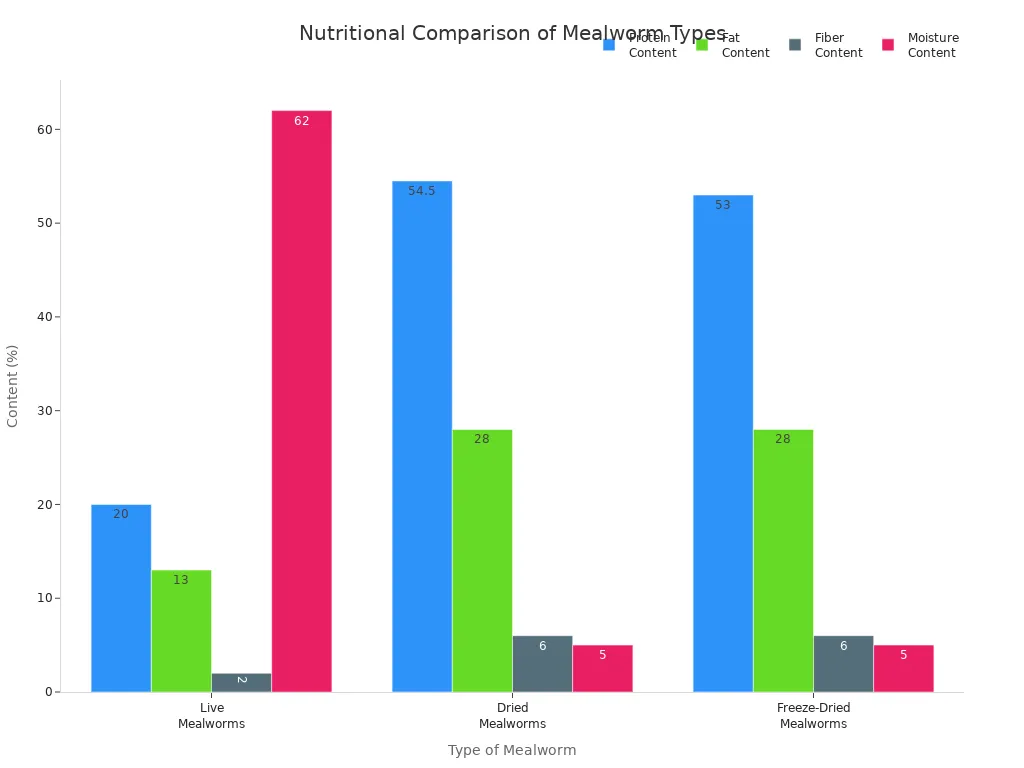
- Mealworms for Parrots offer superior nutrition and natural appeal as a supplement.
- Avian nutritionists highlight their high protein and fat content, supporting growth and immune health.
- Common myths about mealworm feeding lack scientific support.
- Responsible use with a varied diet helps birds stay healthy, energetic, and happy.
FAQ
Are mealworms safe for all parrots and birds?
Mealworms for Parrots suit most species. Owners should introduce them slowly. Always choose high-quality, hygienically raised mealworms for the best results.
How often should parrots eat mealworms?
Parrots benefit from mealworms two or three times per week. Responsible owners follow expert guidelines for portion control to keep birds healthy and energetic.
Can mealworms replace fruits and vegetables in a parrot’s diet?
Mealworms provide protein and healthy fats. Parrots still need fruits, vegetables, and seeds for complete nutrition. For best health, offer mealworms as a supplement, not a replacement.


